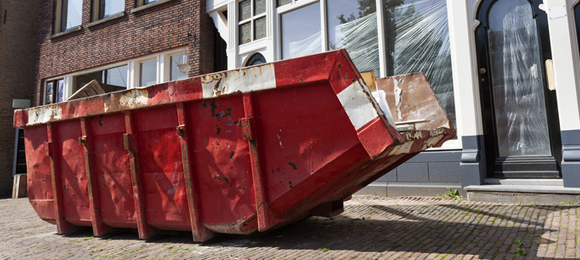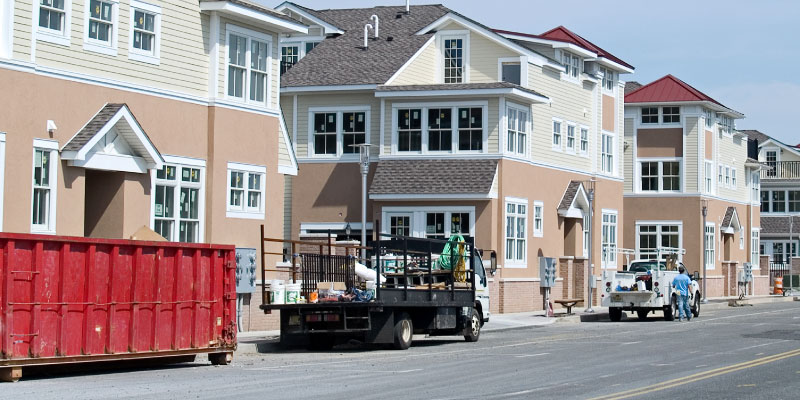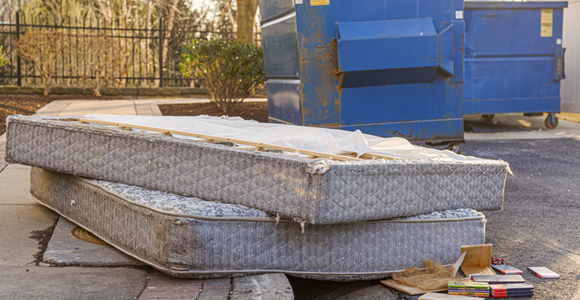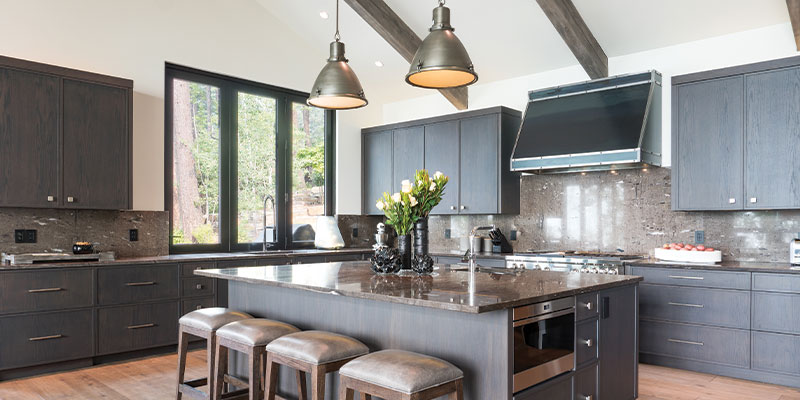
Updated March 7, 2024
A kitchen remodel is an exciting project that many homeowners dream about. It can transform the heart of your home, but it can also generate a significant amount of waste. Renting a dumpster is a convenient way to manage this waste, but choosing the right size dumpster can be a challenge, and we're here to help.
In this guide, we'll explore the various factors to consider so you can choose the right dumpster size for your kitchen remodel.
Jump to:
- Common Dumpster Sizes
- Choosing the Right Size Dumpster
- Other Factors to Consider
- Tips for Efficient Dumpster Use
Find dumpster rentals near you
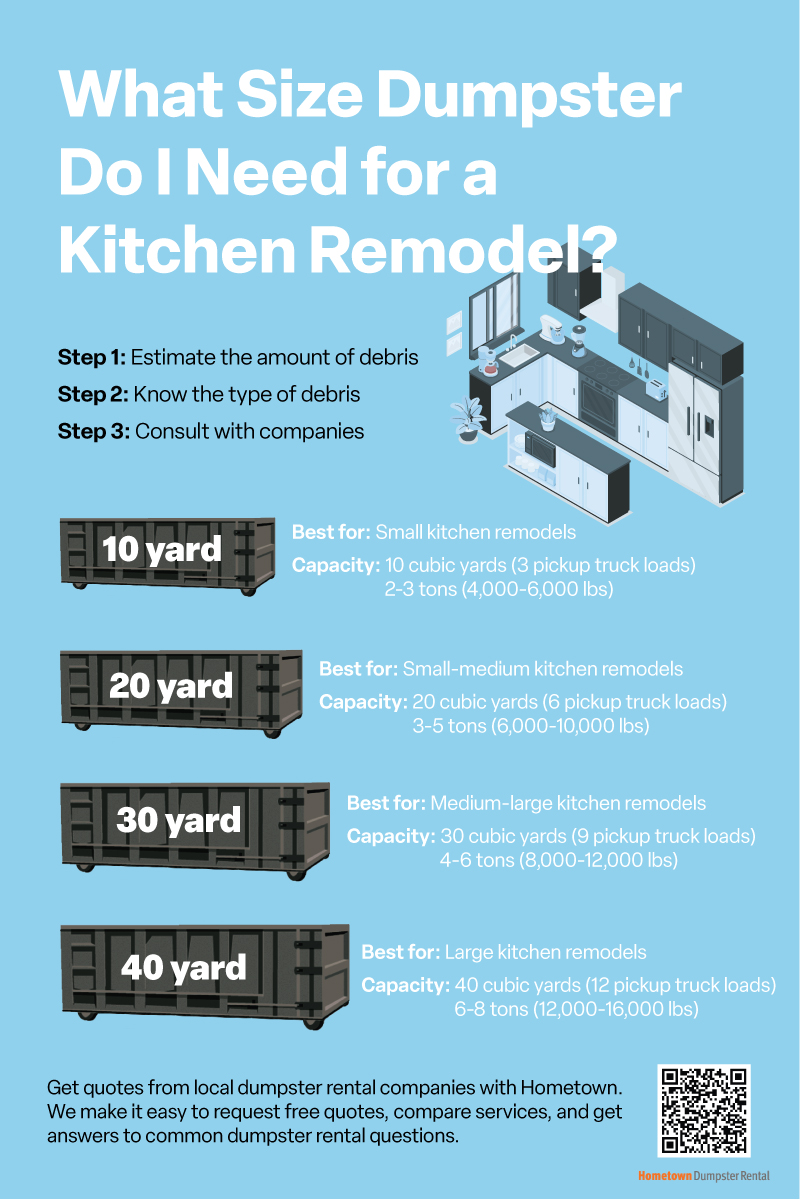
Common Dumpster Sizes
Get to know the most popular dumpster size options. Each company may offer slightly different size options as well as different dumpster weight limits and rental length periods. It's important to not only know the different size options available to you but also the amount of weight included in each dumpster company's dumpster size pricing and how many days you can keep the dumpster on your property without incurring additional fees. All of this information should come into play when deciding the right dumpster size and the right dumpster rental service company for you and your kitchen remodel project.
10 Yard Dumpster
One of the smallest and most popular temporary dumpster size options available is the 10 yard dumpster.
10 yard dumpsters can hold a maximum of 10 cubic yards, or approximately three pickup truck loads, of debris. The average included weight limit for 10 yard containers is 2-3 tons or 4,000-6,000 lbs. (Each dumpster company includes different weight allowances in their dumpster pricing. The companies you speak to may include more or less weight than this in their 10 yard dumpster cost.)
This dumpster size is ideal for small kitchen remodels or for remodel projects at a home with limited space for a dumpster.
20 Yard Dumpster
Another popular dumpster size option is the 20 yard dumpster as it offers double the loading capacity of a 10 yarder while still fitting in most driveways.
20 yard dumpsters can hold a maximum of 20 cubic yards, or approximately six pickup truck loads, of debris. The average included weight limit for 20 yard containers is 3-5 tons or 6,000-10,000 lbs. (Each dumpster company includes different weight allowances in their pricing. The companies you speak to may include more or less weight than this in their 20 yard dumpster cost.)
This dumpster size is suitable for medium kitchen remodels, or a small kitchen remodel along with additional junk or debris cleanup.
30 Yard Dumpster
30 yard dumpsters can hold approximately nine pickup truck loads of debris, or a maximum of 30 cubic yards. (Each dumpster company includes different weight allowances in their pricing. The companies you speak to may include more or less weight than this in their 30 yard dumpster cost.)
This is a great dumpster size for larger kitchen remodels or projects with substantial waste.
40 Yard Dumpster
40 yard dumpsters are one of the largest dumpster size options available. This dumpster size can hold up to 12 pickup truck loads of debris, or a maximum of 40 cubic yards. (Each dumpster company includes different weight allowances in their dumpster cost. The companies you speak to may include more or less weight than this in their 40 yard dumpster pricing.)
These dumpsters are popular for large projects, including major kitchen remodels, demolition projects, construction, or other large-scale renovations.
Choosing the Right Size Dumpster
Picking the right dumpster size for your kitchen remodel can seem tricky, but it doesn't have to be. There are a few simple steps to follow...
Step 1: Estimate Debris
The first step to choosing the right dumpster size for your kitchen remodel project is by estimating the volume of waste your project will generate. Consider the scope of your remodel, including how much demolition or junk removal needs to take place.
For example, a kitchen remodel that includes taking a kitchen with the dimensions of 15 feet long by 10.5 feet wide down to the studs will involve roughly 150 square feet of debris, which equates to 12.5 cubic yards.
Read on: How to Estimate the Weight of a Dumpster Load to Avoid Overage Fees
Step 2: Consider the Type of Debris
Once you have a rough estimate of the amount of debris your kitchen remodel will generate, it's time to take the type of debris into account. This is because different types of debris take up different amounts of space in a dumpster and weigh different amounts.
For example, if your kitchen remodel involves removing kitchen cabinet boxes or appliances, you can expect the cubic yardage of your debris to increase. Cabinet boxes alone can take up quite a bit of space and can weigh anywhere from 50-200 lbs on average. Similarly, kitchen appliances take up varying amounts of space in a dumpster and can weigh anywhere from 28 lbs on average for a microwave and 420 lbs on average for a refrigerator.
If you're not removing your cabinet boxes or your kitchen appliances, then your debris footprint will be much smaller and you can likely get away with a smaller dumpster.
Keep reading:
Step 3: Consult with Companies
Once you've estimated the amount and the type of debris your kitchen remodel project will produce, it's time to reach out to local dumpster rental companies near you. They will be able to recommend the best dumpster size for your project in their opinion, as well as provide a free quote for the dumpster size they recommend and the weight limit that's included. Reaching out to multiple local dumpster rental providers is recommended because it ensures you get the right dumpster for your project's needs as well as the best service.
Hometown makes getting dumpster quotes easy. Simply enter your zip code in the text box above to request free quotes from providers near you.
Learn more: How to Compare Quotes and Rent a Dumpster from the Right Company
Other Factors to Consider
In addition to the amount and type of debris you'll need to toss in your dumpster, you'll also want to consider a few other things...
-
Local Regulations: Check with your local municipality to understand any regulations regarding dumpster placement, size restrictions, and permits required for placing a dumpster on your property or in a public right-of-way. Most cities do not require a dumpster rental permit when placing a dumpster on your own private property, like a driveway or yard, only requiring a permit when the dumpster is placed on public property or in the public right-of-way. Your city's local department website should list these requirements.
-
Dumpster Accessibility: Consider the space available for the dumpster on your property. If you have a narrow or uneven driveway, this is important information that the dumpster companies you speak to should be aware of. When choosing the right dumpster size for your kitchen remodel, you'll want to make sure it can accommodate your debris but also that the dumpster delivery truck can maneuver and place the dumpster safely in a location that's easy for you to access and load your debris.
-
Dumpster Functionality: Dumpsters come in different types, from roll-off dumpsters to trailer dumpsters or even bag dumpsters. When renting a dumpster for a kitchen remodel, consider whether or not you'll need to load heavy items into the dumpster. If you do have bulky or heavy items, it's ideal to rent a dumpster that has a hinged swinging door that makes it easy to walk large or heavy items into the dumpster. At the very least, if the dumpster does not have a swinging door that allows you to walk into the dumpster, it should have low sides for easily placing items over the sides of the dumpster.
Tips for Efficient Dumpster Use
Break Down Materials
Disassembling cabinets, countertops, and other large items before placing them in the dumpster can help maximize the space inside the container.
Load Strategically
Loading the dumpster requires some slight forethought. You don't want to just throw everything in there. Instead, place large or heavy items at the bottom of the dumpster to try and create a stable base and prevent the dumpster from becoming unbalanced. Once the heaviest items are loaded into the dumpster, fill in the empty spaces with smaller, lighter items to maximize the use of the space and ensure the dumpster is filled efficiently.
Avoid Overloading
Remember to be mindful of both the dumpster's fill line and the dumpster's weight limit to avoid overloading it. Not only is this dangerous but it can result in additional fees.
Learn more: Why Can't I Fill My Dumpster to the Top?
Recycle Materials
Whenever possible, recycle materials such as metal, glass, and cardboard to reduce the amount of waste going into the dumpster.
Choosing the right size dumpster for your kitchen remodel is essential for efficient waste and project management. Consider the amount and type of waste you'll generate, local regulations, and available space when selecting a dumpster size. By planning ahead and following these tips, you can ensure a smooth and successful kitchen remodel project.
